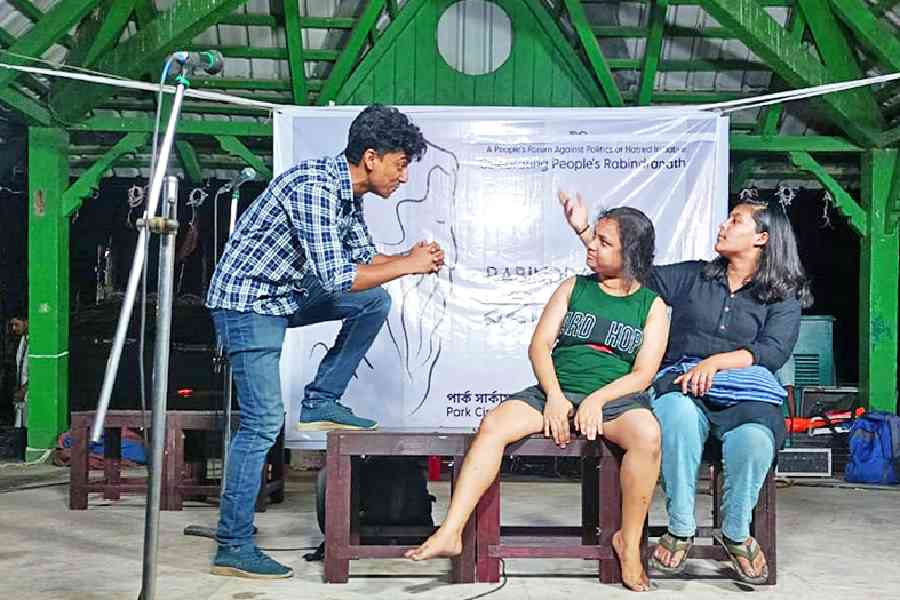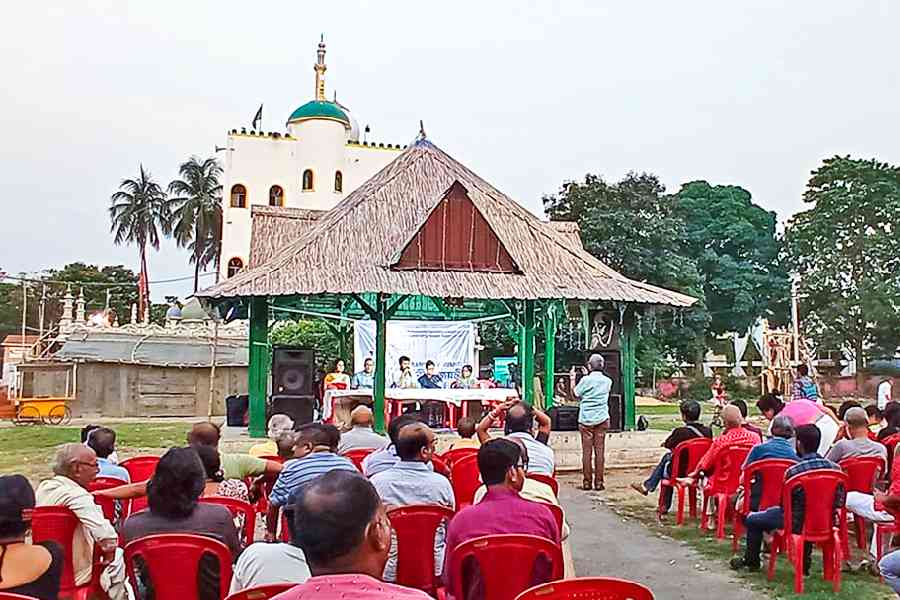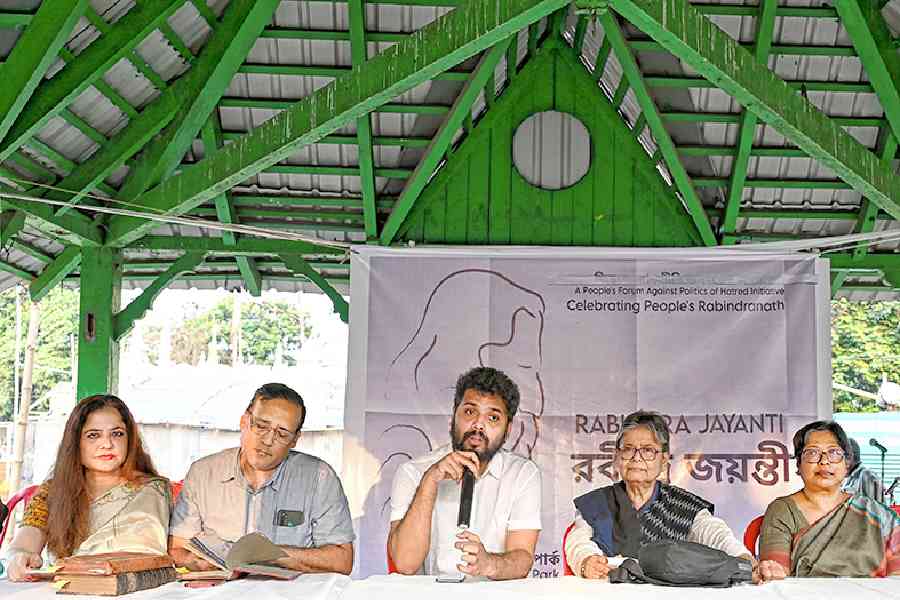In 1932, Rabindranath Tagore went to Iran (then Persia) at the invitation of the country’s ruler, Reza Shah Pehlavi.
Historian Jadunath Sarkar had written this to describe a meeting between Tagore and members of the clergy during that trip.
“A few mullahs of Tehran asked the poet how to find the true way among different religions prescribing different ways. It was a question similar to how to get light in a closed room. Various answers were given — striking a light, flint, oil lamp, candle, electric light.”
Sarkar then goes on to quote Tagore’s reply. “To a naturally intelligent man, without bookish learning, the true or best way would be to open all doors and windows, to be good, love each other and do good. For where scriptures and theory and ritual are supreme, wordy bickering end in the killing of throats. In the past, the people had lost their autonomy, their freedom of thought and worship on account of the entente between the royal authority and the priestly authority. Any deviation from the compulsorily fixed rule or rite was rebellion. That was the essence of sectarian or communal religion. As the horizon of knowledge expands, man gains newer experience, conditions change, rules and rites have also to be adapted to the changed conditions.”
Sarkar says: “The Poet’s analysis of world history and Indian history taught him that sectarian or communal religion was more unreasonable, more cruel and blind and more harmful than materialistic worldliness. As in Kamal’s Turkey, religion should be secularised.”
The piece was read out by doctor-activist Fuad Halim at a panel discussion during a programme to mark the 162nd birth anniversary of Tagore at Park Circus Maidan. He read from Tagore and Iran, a chapter of a 1986 edition of Indo-Iranica, the quarterly journal of the Iran Society.

A dramatised adaptation of Tagore’s Totakahiniat the programme
The programme was organised as a counter to the Right-wing ecosystem’s bid to “appropriate” Tagore in the name of nationalism. More specifically, it was held as a counter to Union home minister Amit Shah’s programmes on Tagore’s birth anniversary.
The choice of venue is also significant, said another panellist.
“This ground witnessed one of the most powerful protests against the CAA-NRC combine. Today, some of us with Arabic names, how do we feel in this country? We are branded traitors if we question the government. How would have Tagore reacted to this situation?” said Afroja Khatun, who teaches Bengali at a college in central Calcutta.
“Tagore was the one who stood at the forefront of the opposition to Banga Bhanga (Partition of Bengal), one who used Rakhi to resist the Partition.”
Midway through the session, the panel stopped the discussion for a few minutes as the sound of azaan emerged from a mosque bordering the ground.
Halim, who has contested Assembly elections on a CPM ticket, spoke of a key difference between Tagore and Narendra Modi, one that came to the fore during two enormous crises, the Calcutta Plague of the late 1890s and the Covid pandemic.
“During the plague, Tagore accompanied Sister Nivedita to the slums, supplying relief materials to people. He did not resort to ringing a bell,” said Halim as the audience and many passers-by on the ground started clapping.
Activist Saira Shah Halim, who was part of the panel, said: “People who jail activists and journalists for asking questions can never appropriate Tagore, who preached of a place where the mind is without fear.”
Tagore’s actions and his politics “should be discussed again and again, especially in these troubled times”, said Arka Deb, journalist and moderator of the panel discussion.

The programme at Park Circus Maidan on Tuesday.
“Tagore has been reduced to a statue which is garlanded on some days every year. He has been turned into this apolitical, godly figure. But we need to keep going back to his politics, his worldview andhis actions that mirrored them. Tagore was always critical of a toxic and militant brand of nationalism. He might have made some mistakes but he corrected them and was always self-critical,” said Deb.
Malini Bhattacharya, author-activist and former member of the Lok Sabha (CPM), wondered how Tagore, “who encouraged women to do physical exercises, would have reacted to the torment meted out to the female athletes — who brought laurels to the country — now spending nights on the streets of Delhi”.
“What would have Tagore said upon seeing the Prime Minister and home minister not uttering a word on the issue?
“The beautiful Manipur, Chitrangada’s (Tagore dance drama) Manipur, the home to several ethnic groups. That Manipur is ravaged by violence and hatred among the groups. Again, stunning silence from the Prime Minister and the home minister. What would have Tagore said in these times?” asked Bhattacharya.
The retired professor of English and former director of the School of Women’s Studies at Jadavpur University went on to read excerpts from Tagore’s writings to stress his humanist, secular and egalitarian ideas.
She read from an essay Tagore wrote in 1931. “The Rashtriya Swayamsevak Sangh had been formed by then. Bloodshed between Hindus and Muslims had started. The freedom movement had become bloodstained,” said Bhattacharya.
Tagore wrote: “A country where people are bound primarily by religion, where there is no other bond, is unfortunate.”
“Is Amit Shah listening, is Modiji listening?” asked Bhattacharya.
Tuesday’s programme was organised by the People’s Forum Against Politics of Hatred. A dramatised adaptation of Tagore’s short allegorical fantasy, Totakahini (The Parrot’s Tale), followed the panel discussion.
The play targets the “bid to saffronise” the education system.
“This counter is absolutely essential so we know about the plurality of our nation,” academician Ananda Lal, who was in the audience, told The Telegraph.






